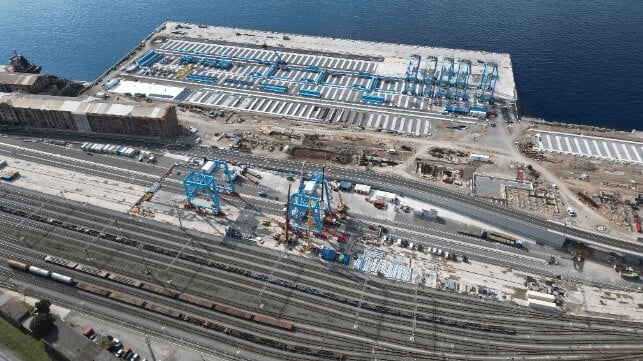Rijeka Gateway Will Be Fully Powered by Electricity from Renewable Sources

[By: Maersk]
Rijeka Gateway, the largest project in the logistics sector in Croatia, has secured electricity from renewable energy sources for the operation of its container terminal, which will reduce CO2 and other harmful gas emissions significantly. The terminal in Rijeka, which is a joint venture between APM Terminals and ENNA Group, will be the most advanced in the Adriatic region, with most of the equipment being electrified and largely remotely operated. When fully operational, the terminal will directly create 300 jobs for professionals of various profiles.
The contract for the use of renewable electricity has been active since the beginning of construction and will continue during the terminal’s operational phase. Renewable energy is sourced from solar and wind power, and ENNA Next, also a supplier of electricity, issues green certificates to ensure that the entire supply comes from renewable sources.
"ENNA Next is pleased to begin cooperation with Rijeka Gateway in supplying renewable energy. As one of the leading energy suppliers in Croatia, we purchase renewable electricity from over 800 producers in Croatia and Germany. In addition to standard electricity and gas products, we pay special attention to developing renewable energy sources for our customers," says Nenad Ukropina, board member of ENNA Next.
We have launched several initiatives that can help us become one of the most sustainable terminals in this part of the world. One of these initiatives is the use of renewable energy sources. As a large consumer of electricity, we believe that using sustainable energy sources is a vital step in achieving the terminal's long-term sustainability," says Peter Corfitsen, CEO of Rijeka Gateway.
Reducing light, noise and marine pollution
The terminal will be equipped with a highly efficient water management and drainage system that eliminates the possibility of marine pollution. Light pollution will also be reduced, with automated lighting systems ensuring that inactive parts of the terminal will not be illuminated when not in use. Additionally, several measures will be introduced to reduce noise levels below legally permitted limits, such as a system that supplies ships with electricity from shore, reducing the need to run ship engines. All cranes at the terminal will use soft landing technology to reduce container loading noise, and new types of sound signals will be used throughout the terminal, replacing traditional beeping with less intrusive white noise.
"From the inception of this project, we wanted Rijeka Gateway to be more than just a generator of economic prosperity for Rijeka, the region, and the rest of Croatia. We want to be a good neighbor, doing everything we can to minimize the terminal's negative impact on the environment and the local community as well as create jobs and sustainable growth opportunities, says Peter Corfitsen, CEO of Rijeka Gateway.
APM Terminals is the largest consumer of electricity within the A.P. Moller – Maersk group, making terminal operations based on renewable electricity a crucial element in the decarbonisation efforts. Additionally, APM Terminals is continuously electrifying its terminals as part of the industry leading target to reach net zero by 2040 which makes the transition to renewable energy ressources vital. Operating Rijeka Gateway on renewable energy supports A.P. Moller – Maersk in the ambition of using 100% renewable electricity by 2030 to decrease scope two emissions.
The products and services herein described in this press release are not endorsed by The Maritime Executive.

